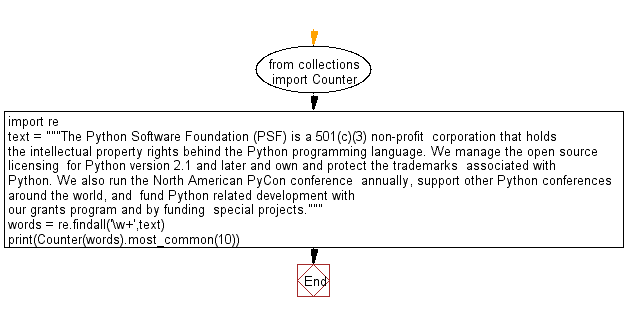Python: Find the occurrences of 10 most common words in a given text
Python Collections: Exercise-4 with Solution
Write a Python program to find the occurrences of 10 most common words in a given text.
Sample Solution:
Python Code:
from collections import Counter
import re
text = """The Python Software Foundation (PSF) is a 501(c)(3) non-profit
corporation that holds the intellectual property rights behind
the Python programming language. We manage the open source licensing
for Python version 2.1 and later and own and protect the trademarks
associated with Python. We also run the North American PyCon conference
annually, support other Python conferences around the world, and
fund Python related development with our grants program and by funding
special projects."""
words = re.findall('\w+',text)
print(Counter(words).most_common(10))
Sample Output:
[('Python', 6), ('the', 6), ('and', 5), ('We', 2), ('with', 2), ('The', 1), ('Software', 1), ('Foundation', 1), ('PSF', 1), ('is', 1)]
Flowchart:

Visualize Python code execution:
The following tool visualize what the computer is doing step-by-step as it executes the said program:
Python Code Editor:
Have another way to solve this solution? Contribute your code (and comments) through Disqus.
Previous: Write a Python program to create a new deque with three items and iterate over the deque's elements.
Next: Write a Python program that accept some words and count the number of distinct words. Print the number of distinct words and number of occurrences for each distinct word according to their appearance.
What is the difficulty level of this exercise?
Test your Python skills with w3resource's quiz
Python: Tips of the Day
Creates a dictionary with the same keys as the provided dictionary and values generated by running the provided function for each value:
Example:
def tips_map_values(obj, fn):
ret = {}
for key in obj.keys():
ret[key] = fn(obj[key])
return ret
users = {
'Owen': { 'user': 'Owen', 'age': 29 },
'Eddie': { 'user': 'Eddie', 'age': 15 }
}
print(tips_map_values(users, lambda u : u['age'])) # {'Owen': 29, 'Eddie': 15}
Output:
{'Owen': 29, 'Eddie': 15}
- New Content published on w3resource:
- Scala Programming Exercises, Practice, Solution
- Python Itertools exercises
- Python Numpy exercises
- Python GeoPy Package exercises
- Python Pandas exercises
- Python nltk exercises
- Python BeautifulSoup exercises
- Form Template
- Composer - PHP Package Manager
- PHPUnit - PHP Testing
- Laravel - PHP Framework
- Angular - JavaScript Framework
- React - JavaScript Library
- Vue - JavaScript Framework
- Jest - JavaScript Testing Framework
